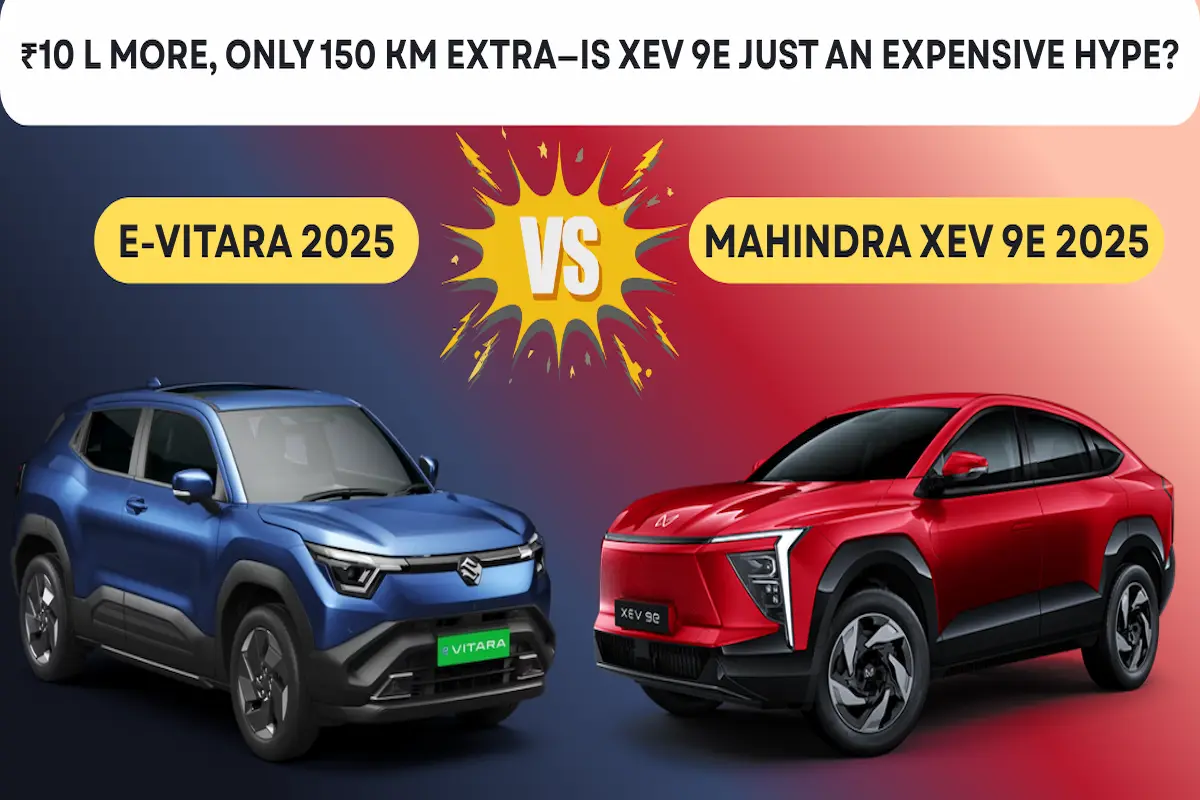Electric SUVs are becoming the next big trend in India, and two of the most anticipated launches of 2025 are Maruti e-Vitara vs Mahindra XEV. In this detailed comparison, we’ll cover range, battery capacity, price expectations, features, charging options, and launch details of both EVs so you can decide which SUV could be the better choice for you.
Table of Contents
India is witnessing a rapid shift towards electric mobility. With government subsidies, improved charging infrastructure, and rising fuel prices, EV adoption is becoming mainstream. While Tata Motors currently dominates the EV space with the Nexon EV and Punch EV, 2025 is set to be a game-changer with Maruti Suzuki’s entry into the electric SUV market through the e-Vitara and Mahindra’s XEV line-up.
Both Electric SUVs are expected to deliver 500+ km range, advanced features, and aggressive pricing to target India’s mid-segment buyers.
Electric SUV Comparison 2025 – Maruti e-Vitara vs Mahindra XEV
| Feature | Maruti e-Vitara 2025 | Mahindra XEV 2025 |
| Range | ~500 km on full charge | ~500–550 km on full charge |
| Expected Price | ₹20–25 lakh | ₹22–27 lakh |
| Charging Time | 30 min (DC fast) | 30–40 min (DC fast) |
| Battery Pack | 48.8 – 61.1 kWh | 59 – 79 kWh |
| Top Speed | ~160 km/h | ~170 km/h |
| Launch Timeline | Mar 2026 | Dec 2025 |
| Target Segment | Urban + family buyers | Tech-driven SUV enthusiasts |
Note: The prices mentioned above are for the base variants of both models. Higher trims of these long-range electric SUVs may come with additional features and longer ranges, but the price gap of nearly ₹10 lakh remains significant, making the value-for-money debate still highly relevant.
Maruti e-Vitara 2025 – Key Highlights
Maruti Suzuki is finally entering the EV SUV space with the much-awaited e-Vitara 2025.
- Range: Expected up to 500 km per charge
- Battery: Around 48.8 – 61.1 kWh pack with advanced thermal management
- Platform: Built on Suzuki-Toyota EV architecture
- Design: Inspired by the popular Grand Vitara but with EV-specific styling
- Infotainment: 12-inch touchscreen, wireless Android Auto/Apple CarPlay
- Safety: 6 airbags, 360-degree camera, ADAS (expected in top variant)
Maruti is positioning the e-Vitara as a family-friendly SUV that combines affordability with long range, something Indian buyers really look forward to.
Mahindra XEV 2025 – Key Highlights
Mahindra has been aggressively investing in EVs under its Born Electric Vision. The Mahindra XEV series is expected to roll out in mid-2025.
- Range: Up to 500–550 km per charge
- Battery: Around 59 – 79 kWh with fast charging capability
- Platform: Based on Mahindra’s INGLO platform
- Design: Futuristic SUV styling with bold LED lighting signature
- Infotainment: Dual-screen setup, AI-powered infotainment
- Safety: 7 airbags, ADAS Level 2, connected car tech
Mahindra’s XEV series is designed to be more premium and tech-loaded compared to Maruti’s offering, directly competing with Hyundai Kona EV and MG ZS EV.
Maruti e-Vitara vs Mahindra XEV : Range & Battery Comparison
| Specification | Maruti e-Vitara | Mahindra XEV |
| Battery Pack | ~48.8 – 61.1 kWh | ~59 – 79 kWh |
| Range (ARAI) | ~500 km | 500–550 km |
| Charging (Fast) | 30 min (0–80%) | 25–30 min (0–80%) |
Both SUVs deliver competitive range, but Mahindra XEV 2025 has a slight edge with a larger battery and faster charging support.
Maruti e-Vitara vs Mahindra XEV : Price Expectations & Variants
Pricing will be the deciding factor in the battle between these two EVs.
- Maruti e-Vitara 2025 Price (Expected):
₹18–22 lakhs (ex-showroom), making it one of the most affordable 500 km EV SUVs. - Mahindra XEV 9E 2025 Price (Expected):
₹22–27 lakhs (ex-showroom), positioned as a premium SUV.
If you are budget-conscious, the Maruti e-Vitara will likely be more affordable, while Mahindra XEV will cater to buyers looking for premium features and tech.
Features & Technology Inside Comparison
| Feature | Maruti e-Vitara | Mahindra XEV |
| Infotainment | 12-inch screen | Dual 12-inch screens |
| ADAS Level | Level 1 (basic) | Level 2 (advanced) |
| Safety Features | 6 airbags, 360 cam | 7 airbags, ADAS, lane assist |
| Comfort | Panoramic sunroof | Panoramic sunroof + ventilated seats |
| Connectivity | Suzuki Connect | Mahindra AdrenoX with AI |
Maruti focuses on essential comfort and affordability, while Mahindra offers a tech-rich premium SUV experience.
Charging Options & Infrastructure
Both Electric SUVs will support DC fast charging along with home charging solutions.
- Maruti e-Vitara : Likely 11kW AC and 120kW DC fast charging.
- Mahindra XEV : Expected 11kW AC and 150kW DC charging.
With charging stations growing across Indian cities, both SUVs will be practical for long drives.
Launch Date & Availability
- Maruti e-Vitara expected launch in India Mar 2026 (as update on 30 Aug 2025)
- Mahindra XEV 9E expected launch in India Dec 2025 (as update on 30 Aug 2025)
Mahindra may launch earlier, giving it a first-mover advantage in the premium EV SUV space.
Petrol Version vs EV Version: Big Shift in Performance & Cost
Both Maruti and Mahindra already sell petrol SUVs in India – like the Maruti Grand Vitara (Petrol/Hybrid) and Mahindra XUV700/XUV300 Petrol. Let’s see how they compare when switching to EV versions:
🔹 Running Cost
- Petrol SUVs – 10 per km (with rising fuel costs).
- EV SUVs – 2 per km (based on electricity rates).
🔹 Performance
- Petrol SUVs – Smooth drive but dependent on fuel prices.
- EV SUVs – Instant torque, faster acceleration, quiet cabin.
🔹 Maintenance
- Petrol SUVs – Higher maintenance (engine oil, filters, etc.).
- EV SUVs – Lower maintenance (fewer moving parts).
🔹 Environment Impact
- Petrol SUVs – Carbon emissions + pollution.
- EV SUVs – Zero tailpipe emissions, eco-friendly.
Clearly, EV versions are the future, especially with government subsidies and charging infrastructure expanding rapidly.
Which SUV Should You Choose?
- Choose Maruti e-Vitara if:
- You want an affordable long-range EV SUV
- You prefer simple yet reliable features
- You trust Maruti’s wide service network
- Choose Mahindra XEV if:
- You want a feature-loaded, premium EV SUV
- You value advanced ADAS & connected tech
- You are willing to spending money more for luxury SUV
Petrol Versions vs EV Versions
One of the biggest questions Indian buyers ask is: “How do EVs compare to their petrol counter parts?”
| Aspect | Petrol Vitara | Maruti e-Vitara EV | Mahindra XUV700 (Petrol) | Mahindra XEV (EV) |
| Price | ₹9–15 lakh | ₹22–25 lakh | ₹14–22 lakh | ₹23–26 lakh |
| Fuel/Energy | Petrol – ₹96/litre | Electricity – ₹1.5/km | Petrol – ₹96/litre | Electricity – ₹1.5/km |
| Running Cost (per km) | ₹8–10 | ₹1.5–2 | ₹8–9 | ₹1.5–2 |
| Maintenance | High (engine, oil) | Low (battery + software) | High | Low |
| Range | 600–700 km | 500 km | 650–700 km | 500 km |
Note :- Petrol cars come with a lower purchase price, their high fuel and maintenance costs make them expensive in the long run. On the other hand, electric vehicles may cost more upfront but offer up to 5X lower running expenses, ensuring greater long-term savings.”
Impact on India’s EV Industry
The entry of Maruti e-Vitara and Mahindra XEV will push the EV industry forward in multiple ways:
- Mass adoption – With Maruti entering EVs, more middle-class buyers will trust electric cars.
- Increased competition – Mahindra’s XEV ensures that Tata, MG, and Hyundai can’t dominate.
- Improved charging infra – Automakers will push for more fast-charging stations across India.
- Reduced costs over time – Competition and higher volumes will bring EV prices down.
- Government support – These launches will accelerate subsidies and state policies.
In short, these EVs will act as a catalyst for India’s EV transformation, much like how Tata Nexon EV started the trend in 2020.The rivalry between Maruti and Mahindra could accelerate EV adoption in India, similar to how competition transformed the petrol SUV segment.
Which One Should You Buy?
Both Maruti e-Vitara 2025 vs Mahindra XEV 2025 represent a major step forward in India’s EV journey. While Maruti will attract budget-conscious buyers with its affordability and strong brand trust, Mahindra will appeal to tech-savvy buyers looking for premium features.
The good news is – Indian EV buyers finally have real choices in the 500 km SUV segment. The competition between these two giants will only benefit customers by driving better features at competitive prices.Either way, both models will push India closer to an EV-first future.
- Buy Maruti e-Vitara if you want affordability, trusted brand value, and low running costs.
- Buy Mahindra XEV if you want premium features, futuristic design, and slightly more range.
People Also Want To Know
Q1. What is the range of the Maruti e-Vitara 2025?
The Maruti e-Vitara is expected to offer around 500 km per full charge.
Q2. When will Mahindra XEV 2025 launch in India?
Mahindra XEV is expected to launch in late 2025.
Q3. Which is cheaper – Maruti e-Vitara or Mahindra XEV 2025?
The Maruti e-Vitara is expected to be slightly cheaper at ₹20–25 lakh, compared to Mahindra XEV at ₹22–27 lakh.
Q4. How do EV SUVs compare to petrol SUVs in cost?
EV SUVs cost more upfront but have 5X lower running costs compared to petrol SUVs.
Q5. Which is better for long-term savings – petrol or EV?
For long-term ownership, EV SUVs like e-Vitara and XEV are much more economical.
Written by Vipin
Founder of PulseUpNXT.com – Simplifying EV adoption for Indian users with practical guides, real-world insights, and hands-on comparisons. Connect on LinkedIn Vipin Kadian and follow on Twitter.

